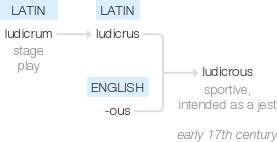Ludicrous
early 17th century (in the sense ‘sportive, intended as a jest’): from Latin ludicrus (probably from ludicrum ‘stage play’) + -ous.
wiktionary
First attested in 1619. From Latin lūdicrus, from lūdō(“play”).
etymonline
ludicrous (adj.)
1610s, "pertaining to play or sport" (a sense now obsolete), from Latin ludicrus "sportive" (source of Old French ludicre), from ludicrum "amusement, game, toy, source of amusement, joke," from ludere "to play."
This verb, along with Latin ludus "a game, play," is from the PIE root *leid- or *loid- "to play," perhaps literally "to let go frequently" [de Vaan], which is the source also of Middle Irish laidid "impels;" Greek lindesthai "to contend," lizei "plays;" Albanian lind "gives birth," lindet "is born;" Old Lithuanian leidmi "I let," Lithuanian leisti "to let," laidyti "to throw," Latvian laist "let, publish, set in motion."
Sense of "ridiculous, apt to evoke ridicule or jest" is attested from 1782. Related: Ludicrously; ludicrousness.
